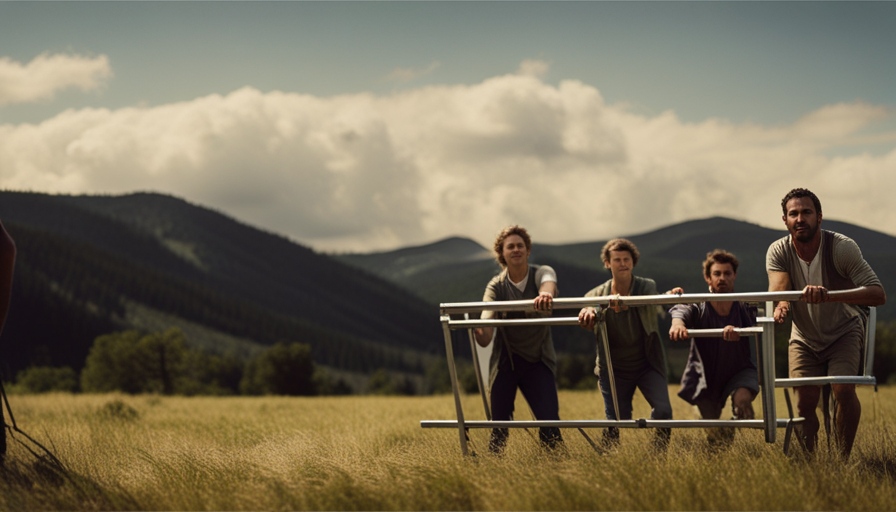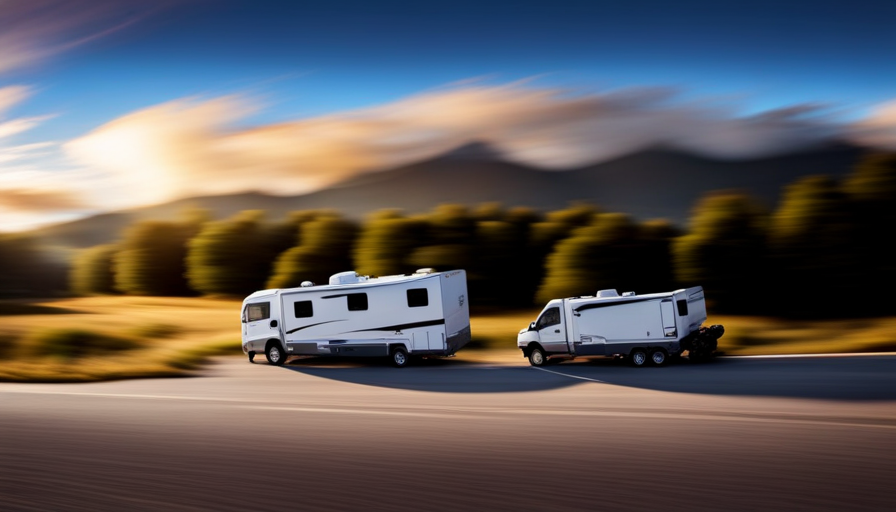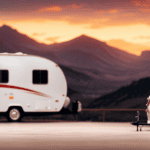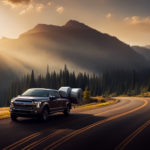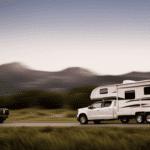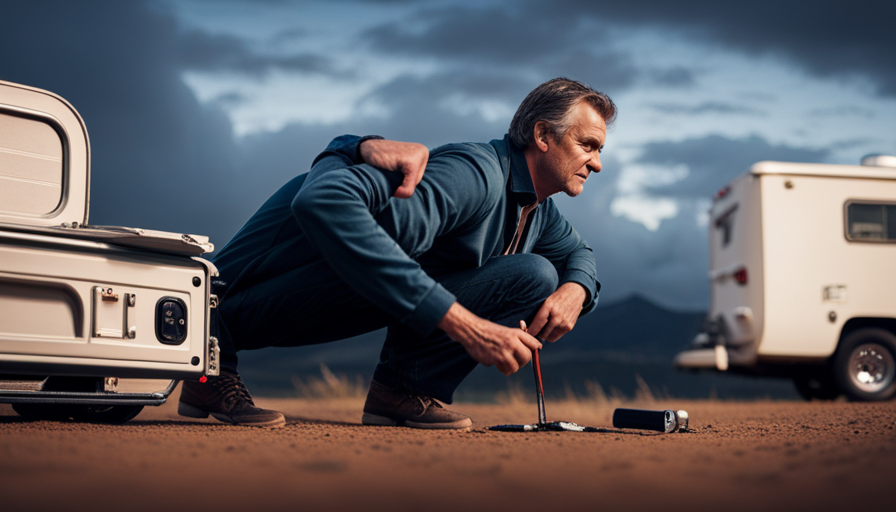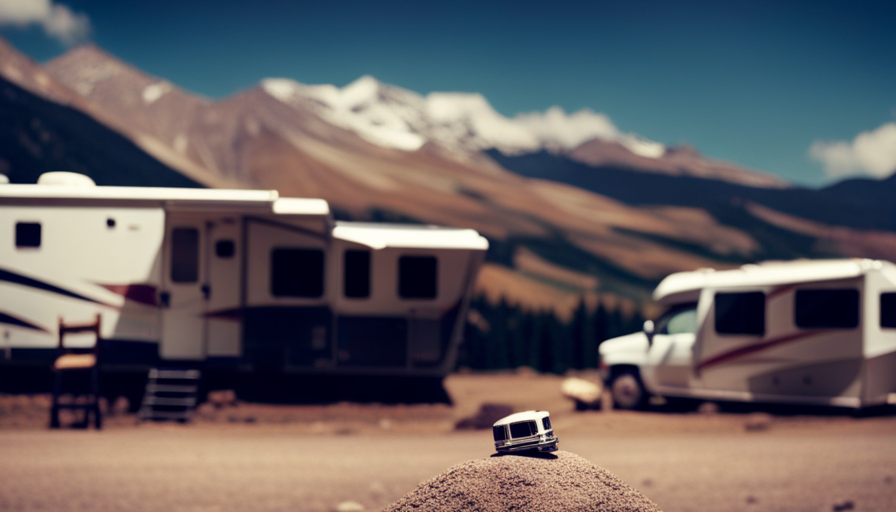Have you ever found yourself in a situation where you need to move your camper trailer but don’t have access to a vehicle? Don’t worry, I have expert advice on how you can manually move your camper trailer. Yes, you can move it by hand.
Now, you might be thinking, ‘How is that even possible?’ But trust me, with the right techniques and a little bit of muscle, it can be done. In this article, I’ll walk you through the step-by-step process of moving a camper trailer without the need for a vehicle.
From assessing the weight and size of your trailer to enlisting the help of others for easier maneuvering, I’ve got you covered. So, let’s dive right in and learn how to move a camper trailer by hand like a pro!
Key Takeaways
- Assess the weight and size of the trailer before attempting to move it by hand.
- Use proper lifting techniques, such as lifting with the legs and not the back, to avoid injury.
- Clear communication and coordination among helpers is essential for a successful movement.
- Secure the trailer to a dolly using straps or ropes to ensure stability during the process.
Assess the Weight and Size of Your Camper Trailer
Before you can even think about moving your camper trailer by hand, it’s essential to assess the weight and size to ensure you have the necessary strength and equipment.
Assessing the weight distribution of your camper trailer is crucial as it will determine how much force you need to exert and the number of people required to move it. Start by checking the trailer’s manufacturer specifications or consult a professional to determine its towing capacity. This information will give you a clear idea of whether you can move the trailer by hand or if you’ll need additional equipment, such as a dolly or a small vehicle.
Next, measure the length, width, and height of your camper trailer. This will help you determine if there are any obstacles or tight spaces that you’ll need to navigate during the moving process. It’s important to consider the size of the trailer and compare it to the available space to ensure a smooth and safe movement.
Once you have assessed the weight and size of your camper trailer, you can proceed to gather the necessary equipment and tools.
Gather the Necessary Equipment and Tools
To get started, make sure you’ve got all the must-have gear and tools in your possession. Moving a camper trailer by hand requires certain equipment maintenance and safety precautions.
Firstly, you’ll need a good quality hand dolly or trailer mover. These tools are specifically designed to help you move heavy loads with ease. Check the wheels and axles of your dolly for any signs of wear or damage, and make any necessary repairs or replacements before you begin.
Next, gather a set of sturdy straps or ropes to secure the camper trailer to the dolly. Ensure that the straps are in good condition and have a high weight capacity to handle the load. Additionally, having a pair of work gloves is essential to protect your hands from any sharp edges or splinters.
Before you start moving, it’s crucial to review safety precautions. Always lift with your legs and not your back to avoid injury. Communicate with a partner to ensure a coordinated effort. If the trailer is on an incline, use wheel chocks to prevent any rolling.
Now that you have the necessary equipment and tools, let’s find a suitable area to move your trailer and continue with the process seamlessly.
Find a Suitable Area to Move Your Trailer
Now that you’ve got all the necessary gear and tools, let’s scout out the perfect spot to relocate your cozy home on wheels! Finding a suitable location is crucial for a smooth and hassle-free move.
Consider the terrain and make sure it’s suitable for maneuvering your trailer. Look for an open area with enough space to accommodate the size of your camper.
First, imagine a spacious field with a level surface that provides ample room for the trailer to be moved around freely. Picture a spot where the ground is firm and stable, ensuring that your trailer won’t get stuck or sink into soft soil.
Secondly, visualize a location without any height or width restrictions. Think of an area with no low-hanging branches or narrow passages that could potentially damage your trailer or hinder its movement. It’s important to have enough clearance to navigate your camper without any obstacles.
Lastly, envision an area with good visibility. Choose a spot where you can easily see the surroundings and anticipate any potential challenges along the way.
Once you have found the perfect spot, it’s time to clear the path and remove any obstacles. This will ensure a smooth and safe journey for your camper trailer.
Clear the Path and Remove any Obstacles
Imagine the satisfaction of effortlessly gliding your mobile abode through a cleared path, obstacles banished, as you embark on your next adventure. When it comes to moving a camper trailer by hand, creating a clear path is crucial. To clear the path and remove any obstacles, you need to start by clearing debris and ensuring that the area is safe for maneuvering your trailer.
To effectively clear the path, it is essential to assess the area and identify any debris or obstructions that may hinder your movement. This could include fallen branches, rocks, or any other objects that may impede the trailer’s path. Once identified, remove these obstacles carefully to prevent any damage to your trailer or injuries to yourself.
To provide a visual representation of the importance of clearing the path and removing obstacles, let’s take a look at the following table:
| Obstacles | Potential Damage |
|---|---|
| Fallen branches | Scratches or dents on the trailer |
| Rocks | Damaged tires or undercarriage |
| Other objects | Tripping hazards or trailer misalignment |
By clearing the path and removing obstacles, you ensure a smooth and safe movement of your camper trailer. This sets the foundation for the next step: using proper lifting techniques to lift and shift the trailer seamlessly into your desired location.
Use Proper Lifting Techniques to Lift and Shift the Trailer
Get ready to effortlessly lift and shift your mobile abode by mastering the proper lifting techniques for smooth maneuvering. When it comes to moving a camper trailer by hand, it’s crucial to use proper lifting techniques to ensure your safety and prevent any unnecessary strain or injury.
Here are some key tips to keep in mind.
Firstly, always remember to lift with your legs, not your back. Bend your knees and use the strength of your leg muscles to lift the weight of the trailer. Keep your back straight and avoid twisting or jerking motions. This will help you maintain stability and reduce the risk of injury.
Additionally, it’s essential to maintain a firm grip on the trailer while lifting and shifting. Use your hands and forearms to support the weight and keep it balanced. If possible, recruit a partner to help distribute the load evenly and make the process easier.
Lastly, don’t forget to take necessary safety precautions. Wear sturdy gloves to protect your hands and ensure a secure grip. If the trailer is particularly heavy or difficult to lift, consider using additional equipment like lifting straps or dollies.
With these proper lifting techniques and safety precautions in mind, you’ll be well-equipped to move your camper trailer with ease. Now, let’s explore how to use a tow strap or rope to pull the trailer if needed.
Use a Tow Strap or Rope to Pull the Trailer if Needed
Master the art of effortlessly maneuvering your mobile abode by utilizing a tow strap or rope to gracefully guide your home-on-wheels. When it comes to moving a camper trailer by hand, sometimes a little extra pulling power is needed. By using a winch, you can easily overcome any obstacles that may be in your way.
Attach the winch to a solid anchor point, such as a tree or a sturdy post, and secure it to the trailer. With the winch in place, you can slowly and steadily pull the trailer in the desired direction, giving you greater control over its movement.
Another option for moving your camper trailer is by using a dolly. A dolly provides a stable platform to place the trailer’s hitch, allowing you to easily move it around. Simply attach the dolly to the hitch of the trailer and use your own strength to push or pull the trailer to the desired location. This method is particularly useful when you need to navigate tight spaces or uneven terrain.
By using a tow strap or rope, along with a winch or a dolly, you can easily move your camper trailer with precision and ease. However, if the task seems too challenging or you need assistance, don’t hesitate to enlist the help of others for easier maneuvering.
Transitioning into the next section, let’s explore how having additional hands can make the process even smoother.
Enlist the Help of Others for Easier Maneuvering
When it comes to moving a camper trailer by hand, sometimes you may find yourself in a situation where you need a little extra muscle power. In those cases, it’s important to enlist the help of others.
This subtopic will discuss the importance of communication and coordination among the helpers, as well as strategies for navigating tight corners and narrow spaces.
Having a clear plan and effective communication is essential when working together to move a camper trailer. Before starting, it’s important to assign specific roles to each person involved. This way, everyone knows their responsibilities and can work together seamlessly. Communication should be constant, with clear instructions and signals to ensure everyone is on the same page.
When it comes to navigating tight corners and narrow spaces, there are a few strategies that can make the task easier. One technique is to have one person positioned at the front of the trailer to guide the movement while others push from the back. This allows for better control and maneuverability. Another strategy is to use a spotter who can guide the driver and communicate with the helpers to ensure a smooth and safe movement.
By effectively communicating and coordinating with your helpers, as well as implementing strategies for navigating tight spaces, you can make the process of moving a camper trailer by hand much more manageable. With these techniques in mind, you can now transition to the next section about taking breaks and resting as needed to avoid strain or injury.
Take Breaks and Rest as Needed to Avoid Strain or Injury
To ensure your well-being and prevent any strain or injury, it’s crucial to take breaks and rest as needed throughout the process of maneuvering your camper trailer.
Moving a camper trailer by hand can be physically demanding, so it’s important to listen to your body and take regular rest breaks. This will give your muscles time to recover and prevent overexertion. During these breaks, make sure to hydrate and stretch to keep your body in optimal condition.
Resting not only helps prevent injuries, but it also allows you to approach the task with a clear mind. Fatigue can lead to poor decision-making and increased risk of accidents. If you start to feel tired or notice any signs of strain, it’s time to take a break. Pushing through exhaustion can lead to serious injuries and make the overall process more difficult.
Remember, maneuvering a camper trailer requires precision and patience. Rushing through the process can lead to accidents or damage to your trailer. So, take your time, practice patience, and ensure a safe move.
By taking breaks and resting as needed, you’ll maintain your physical well-being and be better equipped to handle the task at hand.
Practice Patience and Take your Time to Ensure a Safe Move
Be sure to approach the task of moving a camper trailer by hand with a relaxed and unhurried mindset to ensure a smooth and secure journey. Patience is key when it comes to moving a heavy trailer, as rushing can lead to accidents or injuries.
One important aspect to consider is the importance of communication during the trailer move. Make sure to have clear and concise communication with your team members to avoid any mishaps or misunderstandings. This will help everyone stay coordinated and work together effectively.
To maintain balance and stability while moving a camper trailer, there are a few tips to keep in mind. Firstly, distribute the weight evenly among the people helping you move the trailer. This will prevent any sudden shifts or imbalances. Additionally, it’s crucial to maintain a strong grip on the trailer and use proper lifting techniques to avoid straining your back or causing injury.
As you practice patience and take your time to ensure a safe move, it’s important to remember that the journey doesn’t end once the trailer is in motion. In the next section, we’ll discuss how to double-check the trailer’s position and secure it in place.
Double-check the Trailer’s Position and Secure it in Place
Once you’ve successfully maneuvered your camper trailer, it’s crucial to ensure its position is secure and locked in place. This is a critical step in preventing any accidents or damage while your trailer is stationary. Double-checking the trailer’s position and securing it properly will give you peace of mind and ensure a safe camping experience.
To begin, make sure the trailer is positioned correctly in the desired spot. Use a level to ensure it is on a flat surface, as this will prevent any unwanted movement. Next, engage the trailer’s parking brake to keep it from rolling.
Now, let’s dive into securing the trailer in place. I find it helpful to use wheel chocks on both sides of the trailer wheels. These chocks will prevent the trailer from moving forward or backward. Additionally, it’s essential to attach stabilizer jacks to the corners of the trailer. These jacks will provide additional stability and minimize any swaying or rocking.
To help you visualize the process, here’s a table outlining the steps to secure your trailer:
| Steps to Secure the Trailer |
|---|
| 1. Position the trailer on a level surface |
| 2. Engage the parking brake |
| 3. Place wheel chocks on both sides of the wheels |
| 4. Attach stabilizer jacks to the corners of the trailer |
By following these steps and securing your trailer properly, you can rest easy knowing that your camper is stable and won’t move unexpectedly. Taking these extra precautions will help ensure a safe and enjoyable camping experience.
Frequently Asked Questions
Can I move a camper trailer by hand alone?
Sure, moving a camper trailer alone can be quite a challenge. Maneuvering such a heavy and cumbersome object without any assistance is no easy task. You’ll have to rely on sheer strength and determination to get the job done. However, with proper technique and a little bit of ingenuity, it is possible. Just keep in mind that it might take some time and effort to successfully move your camper trailer by hand alone.
How do I properly assess the weight and size of my camper trailer?
To properly assess the weight and size of my camper trailer, I’d start by determining its weight capacity. This can usually be found in the owner’s manual or on the manufacturer’s website.
Next, I’d measure the trailer’s dimensions, including its length, width, and height. This will give me a better understanding of its overall size and how it may fit in different camping spots or storage areas.
By assessing the weight capacity and calculating the trailer dimensions, I can make sure I’m properly equipped for towing and storage purposes.
What equipment and tools do I need to move a camper trailer by hand?
To move a camper trailer by hand, you’ll need a few essential tools and equipment. Firstly, you’ll require a sturdy trailer dolly or a hand truck specifically designed for moving heavy loads.
Additionally, you’ll need a set of strong straps or ropes to help secure the trailer during transportation.
It’s also important to have a level surface to minimize the effort needed to move the trailer.
With the right equipment, moving a camper trailer by hand becomes easier and safer.
Are there any specific safety precautions I should take when moving a camper trailer by hand?
When moving a camper trailer by hand, it’s crucial to take specific safety measures to minimize potential risks.
First and foremost, ensure that the trailer is properly hitched and securely attached to prevent detachment during the move.
Additionally, use proper lifting techniques to avoid strain or injury to yourself.
Clear any obstacles or hazards from the path before starting, and always have a spotter to guide you and alert you to any dangers.
How do I secure the camper trailer in place once it has been moved?
To secure a camper trailer in place, there are a few key tips to follow.
First, use wheel chocks on both sides of the wheels to prevent any movement.
Additionally, engage the parking brake if your camper trailer has one.
Next, consider using stabilizer jacks to provide extra support and stability.
It’s also a good idea to use leveling blocks to ensure your trailer is on a flat and stable surface.
Finally, double check all connections and hitch locks to ensure everything is secure.
By following these steps, you can prevent any unwanted movement and keep your camper trailer in place.
Is the Process of Moving a 5th Wheel Camper Similar to Moving a Camper Trailer By Hand?
Moving a 5th wheel camper is not similar to moving a camper trailer by hand. Unlike camper trailers, 5th wheels require a specialized hitch system and a vehicle capable of towing heavy loads. The hitch is typically mounted in the bed of a pickup truck, providing better stability and maneuverability. This setup allows for easier navigation and safer transport of the 5th wheel camper.
Can Moving a Camper Trailer Attract Mice and Require Mouse-Proofing?
Moving a camper trailer can indeed attract mice, as they may see it as a new potential shelter. This makes mouse proof camper techniques essential for keeping these pests at bay. Seal any openings, use rodent-proof materials, and set up traps to prevent infestations while on the road.
Conclusion
Well, who knew that moving a camper trailer by hand could be such a breeze? With the right equipment and a little elbow grease, you’ll be able to maneuver that beast like a pro. Just remember to assess the weight and size, gather the necessary tools, and clear the path before getting started.
And don’t forget to enlist the help of others for some extra muscle power. So go ahead, embrace the irony of moving a massive camper trailer by hand, and show off your skills to all your amazed neighbors. Happy moving!

